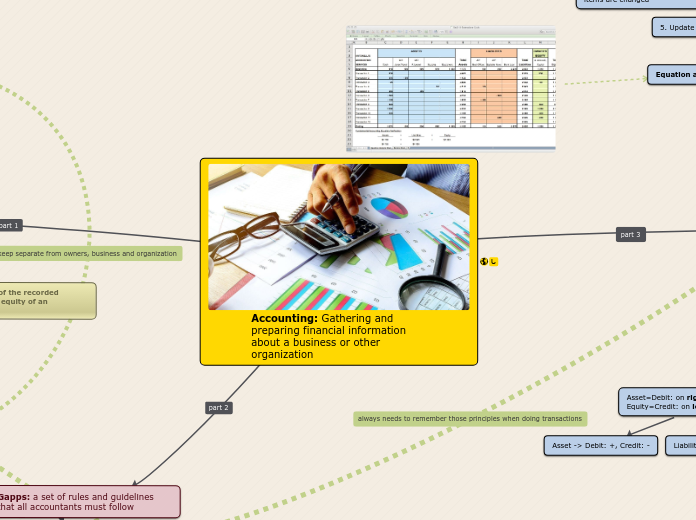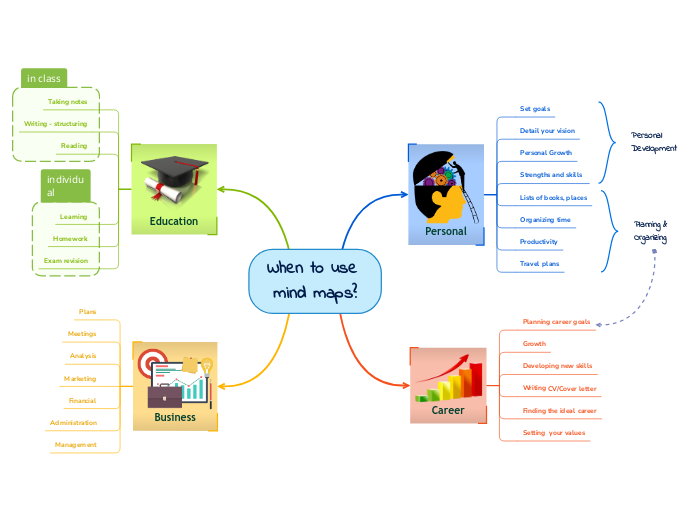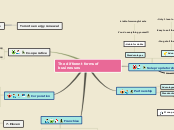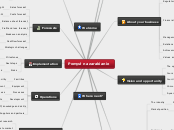e
Fundamental Accounting Practices
Business transaction: cause the
financial position of a business to
change (per event per transaction)
On accounts
Receipt on account
A/R and Bank(cash)
Payment on account
A/P and Bank(cash)
Sold on credit
A/R and Capital
Purchased on credit
Assets and A/P
Equation analysis sheet
Steps
5. Update the balance sheet
4. Make sure each transaction has two individual items are changed
3. Start record each transaction
2. Record the initial balances from its corresponding balance sheet.
1. Write down the fundamental accounting equation and list the items in the assets, liabilities, and owner’s equity sections
Source Document
Business paper
Ex: Invoice, Telephone bill, cheque
copies, store receipts
Ledger: All accounts put together
Trial balance
Debit != Credit -> not in balance
Debit = Cedit -> in balance
Debit credit theory
T-account
Exeptional Balance (an account ends up with a balance opposite to its normal one)
Ex: overpay an account payable; Customer overpays account balance, etc
Account Balance
First record all the transactions on T-account, then subtract the smaller total from the larger total. Write the result under the larger of the two pin totals.
Dollar value of an account and shows whether it is a debit or a credit
Steps(Assets on left; Liabilites & OE on right in the beginning)
3. Record the transactions
2. Record the initial amount for each account
1. Write the names of accounts
Asset=Debit: on right; Liability=Owner's Equity=Credit: on left
Liability/Owner's Equity -> Debit: -, Credit: +
Asset -> Debit: +, Credit: -
Double Entry Theory
Total debit entry=Total credit entry
First entry debit, second is credit
Balance sheet: shows the
financial position of an individual,
company, or other organization on a
certain date.
Fundamental Accounting
Equation
Assets = Liabilities + Owner’s Equity
Assets – Liabilities = Owner’s Equity
Owner's Equity: The difference between our
assets and our liabilities
Liabilities: Things the company owes
Ex: Acounts Payable, Bank Loan, Mortgage
Assets: Resources (things) owned by a business
Ex: Cash, Accounts Receivable, Supplies, Equipment, etc
Correct order
Liabilities
Due day: list what you need to pay first at first
Assets
Order by useful
life
Order of Liquidity
Steps to create a balance sheets
8. Add dollar signs to the first number in each
column, the total assets, and the total liabilities
and equity.
7. Put two ruled line below the two totals
6. Calculate the total Assets and total Liabilities and Equity on a same line with a ruled line (they should be same amount)
5. Calculate Owner's Equity
4. Total the liabilities with a ruled line
above the total.
3. List all the liabiities under the liabilities subheading
2. List all the assets under the assets subheading
1. Write the heading: Who, What, When.
Accounting: Gathering and preparing financial information about a business or other organization
Gapps: a set of rules and guidelines that all accountants must follow
Key principles
Going Concern Concept
Assumes that the business will continue to operate unless it is known that it will not
Principle of Conservatism
Accounting for a business should be fair and reasonable
Ex: You can't say your business worth 1,000,000,000 dollars when you just get started because that's impossible.
Revenue Recognition Principle
Revenue must be recorded when the transaction was complete
Time Period Concept
Consistent time periods
The global standard time periods are monthly, quarterly and yearly.
Full Disclosure Principle
All information needed for a full understanding of a company’s financial statements must be included with the financial statements
Consistency principle
Once you adopt an accounting principle or method, continue to follow it consistently
Matching Principle
Each expense item related to revenue earned must be recorded in the same accounting period as the revenue it helped to earn
Ex: If a bought a thing in 2019 but no one use it until one year later someone use it to make money/do things, then the expense should be recorded 2020.
Objectivity Principle
Provide objective evidence
Ex: You can not say this dessert is the most delicious one in the world because that's probably not correct.
Cost Principle
Record the value as the purchase price.
Ex: If your company used $30 to buy an item, but one day later, it changed to $40, you need to record the money as $30 as this is how much you pay to buy it.
Business Entity concept
Keep separate from the personal affairs of owner, other business or organization
Ex: Business owner can use money for personal things
Accounting Concept
Forms of Ownership
Corporation
Highly regulated by provincial and federal government
Ex: Business names that include Inc (Incorporated), Corp(corporation) or Ltd(limited)
Partnership
Business that owned by two or more partners, share responsibilities and costs
Ex: McPearson & Scott Charterd Accountants
Sole proprietorship
Business that owned by a single person
Ex: Dr.Joe Dimitry; Dentist
Types of Business
Non-profit business
Businesses that do not earn money
Ex: charities; amateur sports organization; curches, etc
Manufacturing business
Buy raw materials and manufacture goods
Ex: computer manufacturer; food-processing company,etc
Merchandising business
Sell physical items (buy from a manufacturer)
Ex: clothing store; department store; grocery store, etc
Service business
Only sell services to customers, provide intangible things instead of physical and durable things. Provided by skilled people
Ex: accounting firm; catering company; cinema; teacher; doctor, etc
Claim Against the Assets
Owners (Called owner's equity)
Creditors (Called liabilities)
Financial Position
The current balances of the recorded assets, liabilities, and equity of an organization









